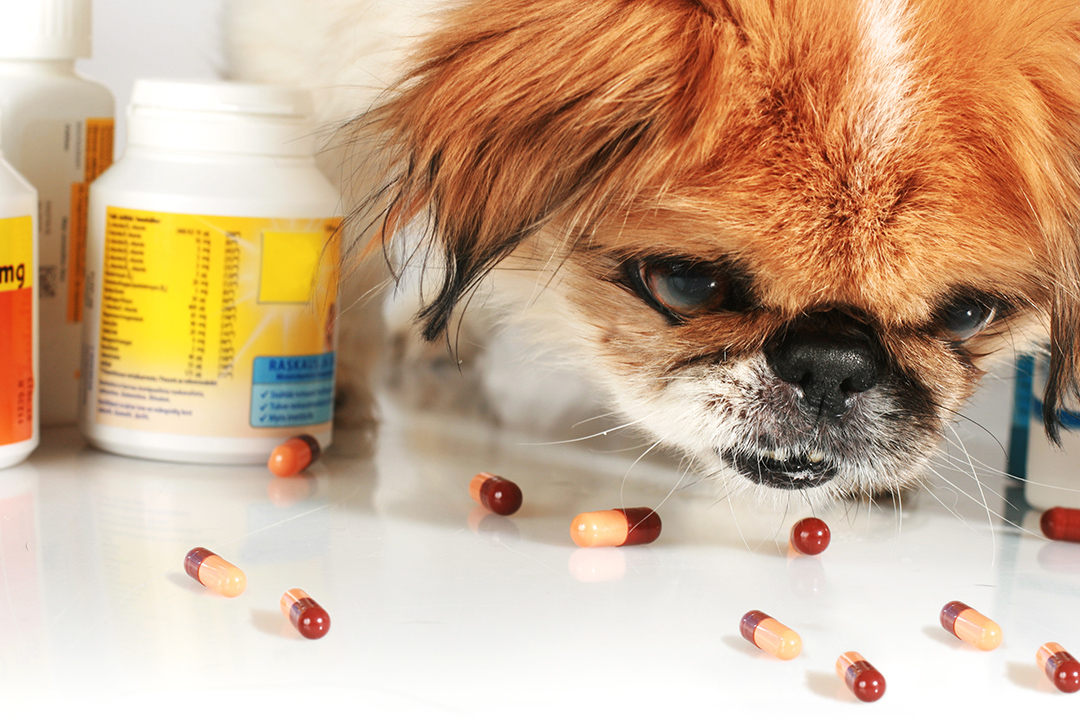
USask study flags human drugs as most common cause for canine poisonings
A University of Saskatchewan (USask) study flags accidental ingestion of human drugs as one of the most common causes of poisoning in dogs that are brought to the Western College of Veterinary Medicine's (WCVM) small animal emergency service.
By Juliet Kennedy
A bottle of Advil (ibuprofen) sitting on the counter is about the same size as a dog toy and makes a rattling sound when it is moved. Inside, there are dozens of shiny, sugar-coated tablets that can be incredibly appetizing to a hungry Labrador retriever.
Every day a dog sees its owner putting an asthma inhaler in their mouth. One day when the inhaler is left on the counter, the dog decides to give it a nibble — unwittingly puncturing the container and swallowing salbutamol (asthma medication).
One morning when an elderly person is taking their medication, their unsteady hands drop a handful of pills that all look alike on the floor. The senior’s pet, an excitable little Maltese-mix dog, snatches up a mystery pill and gobbles it. Now it’s impossible to know which pill the little dog swallowed.
***
These scenarios describe real situations, and all led to emergency trips to the WCVM’s veterinary teaching hospital, which cost owners hundreds — even thousands — of dollars, depending on the severity of the poisoning. And if pets are left unattended with no follow-up veterinary care, there’s a greater risk of long-term damage to the animals’ internal organs that can result in severe complications.
Fortunately, with prompt medical attention, these types of poisonings are typically not fatal. In a Western College of Veterinary Medicine (WCVM) study that reviewed canine poisonings between 2018 and 2023, the college's Veterinary Medical Centre (VMC) treated more than 250 cases of single-dose poisoning (cases in which animals overdosed only one time before being brought to a veterinarian) from human or veterinary drugs with no fatalities.
On average, dogs being treated for drug-related poisoning spent over 12 hours in hospital. The time range increased to 22 hours if there was an abnormal physical exam on assessment by a veterinarian. The average cost of treatment was C$560, with some cases costing more than C$2,000. One canine patient had to be hospitalized for over two weeks because the complications following poisoning were so severe.
Since there is always potential for our pets to swallow any medication found in our homes, it is important to be aware of the risks and be able to recognize the signs of a potential poisoning. As well, it’ is vital to know how to prevent these events from happening.
The most common type of medication ingested by dogs are non-steroidal anti-inflammatory drugs (NSAIDs) intended for human use, which are all considered toxic for dogs. The list includes ibuprofen (sold under brand names like Advil and Motrin), naproxen (sold as Aleve), and acetylsalicylic acid (aspirin).
All these drugs pose a risk for ulceration of the gastrointestinal tract as well as acute kidney and liver injury, all of which can be fatal if left untreated. While acetaminophen (sold under the trade name Tylenol) isn’t technically an NSAID, it’s also an over-the-counter human pain medication and can cause severe liver damage in dogs. Early signs of poisoning from these types of drugs typically include lethargy (lack of energy), and signs of gastrointestinal upset such as vomiting, diarrhea and a lack of appetite.
Psychiatric medications — antidepressants, attention deficit/hyperactivity disorder (ADHD) medication, and antipsychotic drugs — are another common type of drug that canine patients commonly ingest. The clinical signs brought on by these types of drug poisonings can be very dramatic because they affect the animal’s brain. Abnormal behaviours may include lethargy, excitement, confusion, anxiety, agitation, disorientation and gait abnormalities.
It is vital that pet owners ensure that all human and veterinary medications in the home are stored and dispensed properly. Keeping drugs in a locked cabinet or drawer — or at least a high cabinet rather than storing containers on a counter — has the potential to prevent poisonings. Dispensing medications into a small bowl or tray rather than onto a counter or into your hand can also prevent dangerous drugs from accidentally being dropped on the floor.
If you suspect your dog may have accidentally ingested medication, please contact your local veterinarian or call 1-855-764-7661 (Pet Poison Helpline, available throughout North America, incident fee applies).
Juliet Kennedy of Victoria, B.C., is a second-year veterinary student who worked as a summer research student in 2024. Her story is part of a series of articles written by WCVM summer research students. Research was funded by the WCVM’s Interprovincial Undergraduate Summer Research Award and the Boehringer Ingelheim Veterinary Scholars Program.
Together, we will undertake the research the world needs. We invite you to join by supporting critical research at USask.
